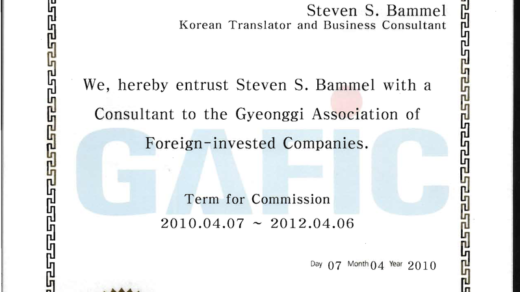It is surprisingly easy to generalize about certain organizational practices in both large and small Korean companies. These are described in my Executive Report: “Succeed in Korean Business by Understanding Korean Company Hierarchy” (Available in the KBC Business Library).
In a recent email discussion with an international executive recruiter working to fill an executive position in the Korean subsidiary of a multinational company, I answered the following questions he had:
- What is the most common job title(s) for someone reporting to the CEO/country managing director?
- To what extent does this vary between companies? Do you know the most typical title for someone at this level at [fusion_builder_container hundred_percent=”yes” overflow=”visible”][fusion_builder_row][fusion_builder_column type=”1_1″ background_position=”left top” background_color=”” border_size=”” border_color=”” border_style=”solid” spacing=”yes” background_image=”” background_repeat=”no-repeat” padding=”” margin_top=”0px” margin_bottom=”0px” class=”” id=”” animation_type=”” animation_speed=”0.3″ animation_direction=”left” hide_on_mobile=”no” center_content=”no” min_height=”none”][Company X}?
- Does the title depend also on age, or is it just dependent on where the person sits within the organization and who they report to?
- To what extent are Koreans usually willing to move for a role with the same job title?
Read the full email exchange: “Answers to Questions about Korean Company Hierarchy”
Quick Tips for Successful Personnel Recruitment in Korea
I’ve condensed the above discussion with the recruiter to the following recruiting tips:
- Hire retired Korean executives for their business networks and ability to get things done in Korea, rather than for their specialized subject-matter expertise.
- Hire younger Koreans to roles they wouldn’t normally be old enough for in a Korean company.
- Tip #2 applies to female professionals, also. Thus, younger women may be the most undervalued asset in the Korean job market today!
- Non-Korean employees in Korea face very different sets of expectations than Koreans. There are no easy rules-of-thumb to follow (as evidenced by our interviews with Dr. Linda Myers, Didier Chenneveau and Dr. David Dolinger.)
What do you think? Anything I missed? Some nuances I should have covered? Can you share your thoughts in the discussion?
Additional Resources on KBC
- Learn the ins-and-outs of Korean company business practices in the KBC Professional Certification Program
- Work in Korean Company
- Start & Run a Business in Korea
- Korean Business Savvy
** BTW, if you come across information here that you disagree with or that needs to be updated, don’t hesitate to leave a comment and share your opinion/knowledge![/fusion_builder_column][/fusion_builder_row][/fusion_builder_container]



